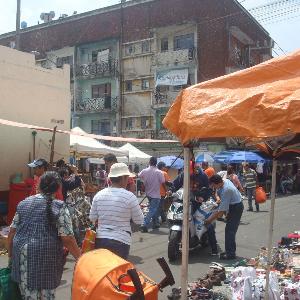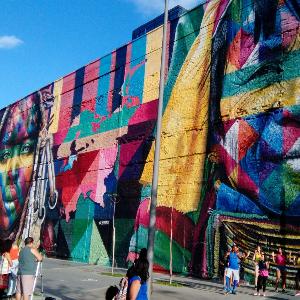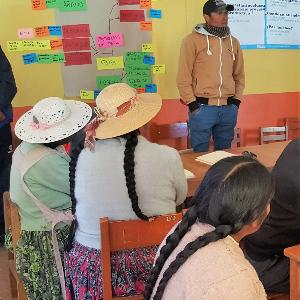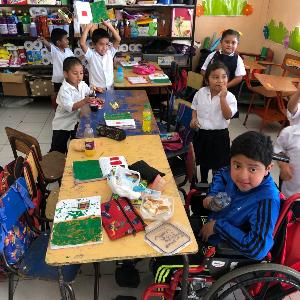LMU Latin America Network
The Latin America Network was set up by researchers at LMU as an institutionally backed strategic framework designed to facilitate thematic collaborations with partners based in the region.
The Latin America Network was set up by researchers at LMU as an institutionally backed strategic framework designed to facilitate thematic collaborations with partners based in the region.
Prof Dr. Eveline Dürr, Institute of Social and Cultural Anthropology
In 2016, a group of Guatemalan Mayan weavers belonging to the AFEDES organization (Women's Association for the Development of Sacatepéquez) presented an action of unconstitutionality against the State of Guatemala before the Supreme Court of Justice. The weavers sued the State of Guatemala for the omission of regulations that protect their textile creations from designers, entrepreneurs and fashion companies who plagiarise and commercialise ancestral textile designs without giving any recognition to the Mayan communities from which they derive. Despite the many efforts and actions of the women weavers, the Guatemalan congress has not given any kind of response regarding the approval of the law for the protection of indigenous intellectual property rights. Currently, Mayan women weavers continue to fight for the protection of their ancestral weavings, establishing their presence in various political, economic, artistic, educational, ecological and activist fields.
In this seminar, representatives of the National Movement of Mayan Weavers of Guatemala – María Elena Curruchiche, Gloria Estela García, and Angelina Aspuac – will share their expertise on Indigenous Intellectual Property Rights and ancestral Mayan textiles.
Guatemalan anthropologist Sofia González will share her knowledge on non-material extractivism (academic, epistemological and ontological extractivism) and the decolonisation of alliances to achieve collaborations based on responsible solidarity between indigenous and non-indigenous people. Multidisciplinary artist and weaver Doro Seror will share with the audience similar cases of local weavers in Bavaria who are struggling to keep their traditional textile art alive. Doro will also present the cultural exchange project between Mayan weavers and German weavers held in Munich, as an effort to exchange experiences and knowledge about these issues.
Presentation and discussion with Angelina Aspuac, María Elena Curruchiche, Gloria Estela García, and Ana Sofía González
Organizer: Institut für Ethnologie der LMU
Date: 26 October 2023
Venue: Institut für Ethnologie, Oettingenstr. 67, 80538 München
Languages: Spanish und English
Kontaktpersonen:
Henry Kammler
E-Mail: henry.kammler@lmu.de
Prof. Dr. Eveline Dürr
E-Mail: eveline.duerr@lmu.de
Interdisciplinary Conference of the Chair of Criminal Law and Criminology and the Institute for Romance Philology of LMU Munich
Victim or Perpetrator? The Role of Human Beings in Climate Change in the Latin American Context
Extensive fires and the drying up of rivers are examples of the consequences caused by the accumulation of harmful daily practices. Poisoning from dirty sewage, the death of animals due to plastic waste on beaches and air pollution from chemical emissions are just some of the phenomena which are inevitable side effects of the current social model and our life style. The negative effects impact people, animals, and the environment (soil, water and atmosphere) in general and imply a significant change in climatic circumstances as well as in the present and future biological conditions of life. Anthropogenic climate change thus represents an existential crisis for humanity. The population groups that suffer most from climatic changes are those directly linked to and dependent on natural areas such as coastal and rural communities. Populations living in socioeconomically disadvantaged areas are particularly affected although they often contribute the least to climate-damaging practices. The discourse of the crisis within climate research, however, contrasts with the indifference of a large part of world society, as well as with the insufficient measures to counteract climate change. From an interdisciplinary perspective and focusing on Latin America, the objective of this symposium is to reflect on the role that different actors occupy in climate change. We would like to raise the question and discuss whether it is possible to distinguish between victims and perpetrators, and whether such a distinction is correct or useful. Although climate change is a global phenomenon, it is necessary to look at the issue from a regional perspective as it has regional characteristics both in its phenomenology and in the way it is addressed. The event aims to explore the particularities of human practices related to climate change and its consequences, as well as the existing interpretations and social reactions with regard to Latin America.
Organizer: LMU - Chair of Criminal Law and Criminology and the Institute of Romance Philology
Date: 12 July 2023
Venue: hybrid event in person at Ludwig-Maximilians-Universität München, conference room on the ground floor of the Philologicum (Ludwigstr. 25) and online via Zoom
Conference languages: Spanish and Portuguese
Contacts:
Dr. María Laura Böhm
Email: marialauraboehm@jura.uni-muenchen.de
Dr. Teresa Gruber
Email: teresa.gruber@romanistik.uni-muenchen.de
"200 Years of the Monroe Doctrine. Visions of the Americas since the 1820s - A 200 años de la Doctrina Monroe: Visiones de las Américas desde la década de los 1820"
Organizer: Amerika-Institut der Ludwig-Maximilians-Universität München, Historisches Seminar der LMU/ Lehrstuhl für Neueste Geschichte
Date: 24/25 March 2023
Venue: The Bavarian American Academy, Karolinenplatz 3, 80333 Munich
Registration: via Xing
Conference languages / idiomas de la conferencia: English and Spanish / inglés y español
In December 1823, U.S. President James Monroe gave a political annual speech before the U.S. Congress that went down in history as the Monroe Doctrine and had a lasting impact on the relationship between the United States, Latin America and Europe. From a European perspective, the Monroe Doctrine is considered the only relevant vision of the Americas that unfolded between 1820 and 1830. Yet at the same time there existed visions, some competing, some intertwined with the United States, that encompassed the entire continent. Simón Bolivar's Pan-American utopia should be mentioned here, as well as the visions of the Portuguese-Brazilian dynasty to make Brazil the center of a New World - both visions were represented with global aspirations.
Therefore, the 200th anniversary of the Monroe Doctrine offers an ideal occasion to shed light on these core issues of transatlantic foreign policy by speakers from the United States, Latin America and Europe in English and Spanish. The conference will go well beyond the period of the 1820s, discuss the political, cultural, and social contexts of the America visions, and analyze their long-term effects.
Conference organizers:
Prof. Dr. Ursula Prutsch
Prof. Dr. Michael Hochgeschwender
Dr. Carlos Alberto Haas
"Interdisciplinary", "multi-perspective" and "hybrid"
The first major interdisciplinary conference of the LMU Latin America Network, the "LMU Latin America Forum 2022" took place from May 31 to June 1, 2022 in the Senate Hall of the LMU.
Scientists from Argentina, Brazil, Bolivia, Chile, Ecuador, Colombia and LMU presented their answers to interdisciplinary questions from the thematic areas "Science Culture", "Environment", "Health" and "Social Dynamics" in 22 lectures.
The hybrid conference format enabled speakers and panelists to engage in an intensive exchange and networking opportunity on-site in the LMU Senate Hall. Furthermore, over 170 participants joined the conference virtually and actively contributed to the conference via video overlay.
In addition to the interdisciplinary exchange during the Latin America Forum, various meetings, guest lectures and workshops in the departments contributed to the intensification of scientific cooperation.
The conference program (PDF, 136 KB) is still available online.
The presentations of the LMU Latin America Forum 2022 are available as video recordings.
Latin American scientists from diverse disciplines discussed with their partners at LMU Munich how the COVID-19 pandemic has impacted their academic fields and which challenges societies and academic communities are facing at the moment.
In fields ranging from Ethnology to Paleontology, LMU cooperates with academic institutions all over Latin America on projects relating to both research and education. The following research projects provide an indication of the range of collaborative activities at LMU.

© Eveline Dürr (LMU)
In terms of staff numbers, LMU's Institute of Social and Cultural Anthropology is one of the largest in its field in Germany and covers a broad spectrum of regions and cultures. Research on the Cultures of the Americas is one of its major foci (together with studies on Southern and Central Asia, West and East Africa and Oceania).
Most of the issues now under study in Latin America fall within four thematic complexes: human interactions with the environment, ways of life in urban settings, ethnolinguistics and (in partnership with the Oceania Program) cultural relationships, networks and migration in a trans-Pacific context.
Fieldwork is currently underway in Mexico, Bolivia, Peru, Chile and Colombia. In 2019 Eveline Dürr and Henry Kammler published their "Introduction to the Ethnology of Central America – A Handbook on its Indigenous Cultures" (Waxmann), which is the first such survey of the region's cultures to appear in German

© Ricardo Borrmann
Founded in 1949, the Institute of American Studies at LMU is the oldest of its kind in Germany. Its standard curriculum comprises a Bachelor's Program in North American Studies and a Master's Program in "American History, Culture and Society“. These programs provide a grounding in, and a detailed understanding of the social, cultural, literary, economic and political history of the United States of America down to the present day, while the country's multifaceted relations with Canada and Latin America (in particular with Argentina and Brazil) are also covered.
In April 2018, Ursula Prutsch and Clemens van Loyen began a study of the social, historical, cultural and political conflicts that have accompanied the transformation of Rio de Janeiro's port district into a "Showcase for Neoliberal Urban Politics". Their analysis focuses on the urban and ethical dimensions of the debates provoked by the project – which challenge the marketing perspective promulgated by the city's government – and emphasizes the demands made by the district's inhabitants, particularly those of Afro-Brazilian descent.

© Center for International Health (LMU)
As one of five centers for university excellence in development cooperation, the Center for International Health at LMU (CIHLMU) was founded in 2009. Its goal is to improve health conditions in low- and middle-income countries by promoting medical education and research.
With financial support from the German Federal Ministry for Economic Cooperation and Development (BMZ) and the German Academic Exchange Service (DAAD), the center trains medical professionals locally in six areas: International Occupational Health and Safety, Medical Education, Infectious Diseases and Tropical Medicine, Humanitarian Assistance, Pediatrics, and Mental Health. In the process, CIHLMU has established numerous programs and projects in Latin America, Africa, and Asia, and already counts alumni in more than 25 countries.
Since 2021, the Center for International Health is dedicated to "One Health" in an interdisciplinary alliance. The overall goal is to improve health conditions worldwide by understanding the structural health problems caused by the living environment and developing context-specific solutions in a holistic and participatory approach to development cooperation. To this end, CIHLMU collaborates with veterinarians, social scientists and geoscientists from both LMU and partner universities in nine countries in Africa, Asia and Latin America.
The focus is on interdisciplinary training of professionals - from health extension workers to doctoral students. Interactive learning methods are used, many of them online. The portfolio includes traditional courses in Moodle using e.g. H5P, animation videos and 360° images as well as a virtual lab and virtual realities. Research projects e.g. in the areas of pandemic preparedness and impact, antibiotic resistance, wildlife trade are used to teach research skills.
Partners in Latin America are Universidade Federal do Paraná (Curitiba, Brazil), Universidad de San Carlos de Guatemala (Guatemala) and Universidad Mayor, Real y Pontificia de San Francisco Xavier de Chuquisaca (Sucre, Bolivia). Since June 2021, CIH alumna Dr. María Teresa Solis Soto is assigned a CIH Visiting Professor at this university. In addition, our alumni network is active in eight countries in Latin America (from Chile to Mexico). Many of our alumni teach at local universities.

© Prof. Dr. Reinhard Markowetz (LMU)
International agreements (UN, 2007, 2015) have been signed and local legislation has been put in place (1996) to protect the rights of the handicapped in Guatemala, and ensure that they have access to education. However, much remains to be done to create an inclusive educational system in the country. To help achieve this goal, LMU and the Universidad de San Carlos de Guatemala (USAC) formally concluded an agreement in 2017, which envisages the implementation of a range of important measures to improve the educational system in Guatemala.
Since then, students of LMU's Institute of Special-Needs Education have been able to take part in practical courses and undertake field trips in Guatemala. So far, Professor Reinhard Markowetz and Dr. André Gomes have visited Guatemala four times, and held intensive professional-development courses for lecturers and teachers, as well as training courses for parents of children with special needs. A further excursion, in which 13 students will take part, is planned, which will give workshops on conditions that fall within the autism spectrum.
With a view to drawing up a comprehensive regional action plan, a number of exploratory research projects are planned, which will be dedicated to the following goals.
The aim of this research phase is to enhance the educational skills of teachers to enable them to better address the needs of schoolchildren with special educational needs.
LMU is closely associated with the German House of Science and Innovation (DWIH) in São Paulo. Its links with the DWIH provide access to the principal networks of university education and research in Brazil. This should in turn facilitate a dynamic extension of the range of academic contacts available. In addition, LMU can take part in the informational events organized by the DWIH in São Paulo, which will offer further opportunities to make new contacts with stakeholders in the region.